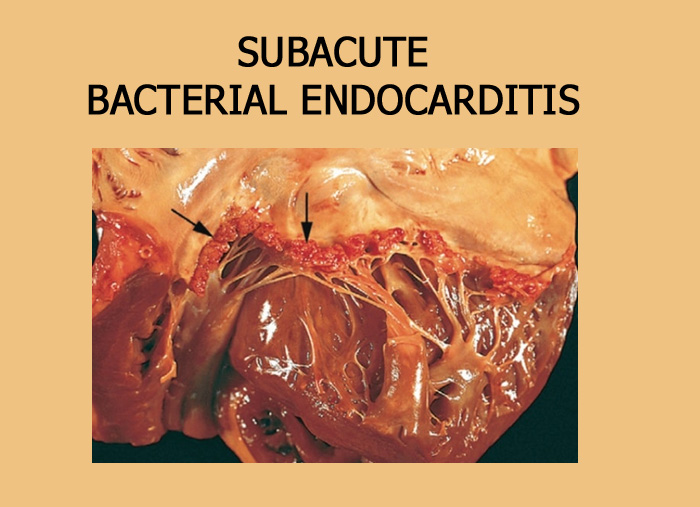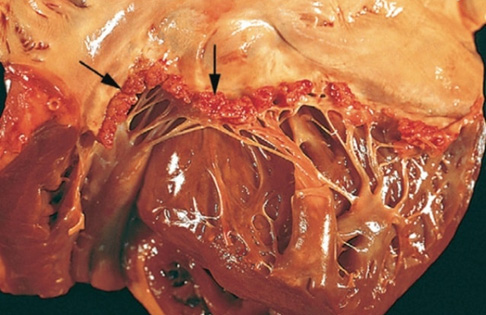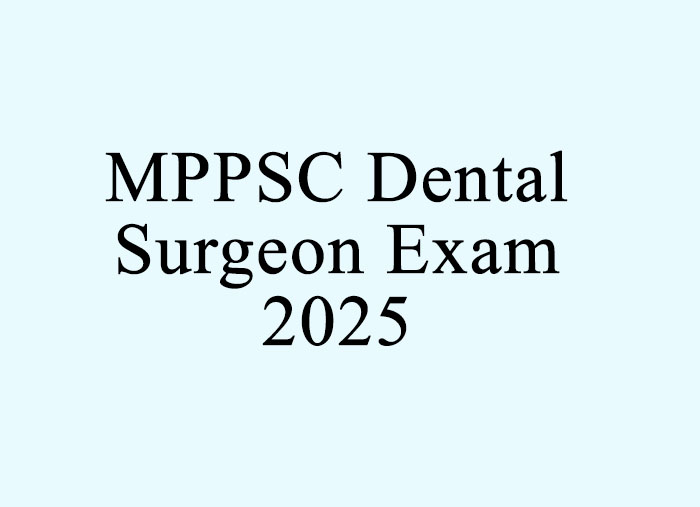- NEED HELP? CALL US NOW
- +919995411505
- [email protected]
Subacute Bacterial Endocarditis

Subacute bacterial endocarditis is a type of infective endocarditis. It’s an infection that occurs when germs such as bacteria enter the bloodstream and attack the lining of the heart valves. This causes growths, called vegetations, on the heart valves.

CLASSIFICATION
- Native valve endocarditis
- Prosthetic valve endocarditis
- Endocarditis in injection drug users
- Nosocromial endocarditis(not includued everywhere)
PATHOGENESIS
- Alteration of the valvular endothelium leading to deposition of platelets and fibrin
- Bacteremia with seeding of non-bacterial thrombotic vegetation(NBTE)
- Adherence and growth, further platelet and fibrin deposition
- Extension to other structures – Papillary muscle, aortic valve ring abscess, conduction system
RISK FACTORS
- Intravenous drug abuse
- Artificial heart valves and pacemakers
- Acquired heart defects
- Calcific aortic stenosis
- Mitral valve prolapse with regurgitation
- Congenital heart defects
- Intravascular catheters
MICROBIOLOGY
- Staphylococcus aureus(30-40%)
- Viridans group streptococci(18%)
CLINICAL FEATURES
- Septicemia
- Petecheal haemorrhage
- Finger clubbing – nail bed haemorrhage
- Embolic complications in kidneys, brain, eyes
- Cardiac failure
SIGNS
- Fever
- Heart murmur
- Nonspecific signs – petechiae, subungal or “splinter” hemorrhages, clubbing, splenomegaly, neurologic changes
- More specific signs – Osler’s Nodes, Janeway lesions, and Roth Spots
DIAGNOSIS
Blood culture
Imaging
Echocardiography
DENTAL TREATMENT CONSIDERATION
- Careful history
- Medical consultation
- Adjusting the anticoagulant therapy
- Antibiotic coverage
- Antiseptic mouth wash
- Local anesthesia with vasoconstrictor to minimize bacteraemia
- Atraumatic dental procedure
- Two weeks is the minimum Interval between sessions
TREATMENT
–Prohylactic antibiotic against BE utilizing
– Cardiac surgery with prosthetic valve replacement
Antibiotic regimen
Standard routine
- Amoxycillin 2 grams orally 1 hour before procedure
- For children 50 mg/kg orally 1 hour before procedure
Unable to take oral medications
- Ampicillin 2 grams (IV/IM) 30 minutes before procedures
- For children 50 mg/kg (IV/IM) 30 minutes before procedures
Allergic to penicillin
- Clindamycin 600 mg orally1 hour before the procedures
- For Children 20 mg/kg orally 1 hour before the procedures
Allergic to penicillin and unable to take oral medication
- Clindamycin 600 mg (IM/IV)30 minutes before the procedures
- For Children 20 mg/kg orally 1 hour before the procedures




